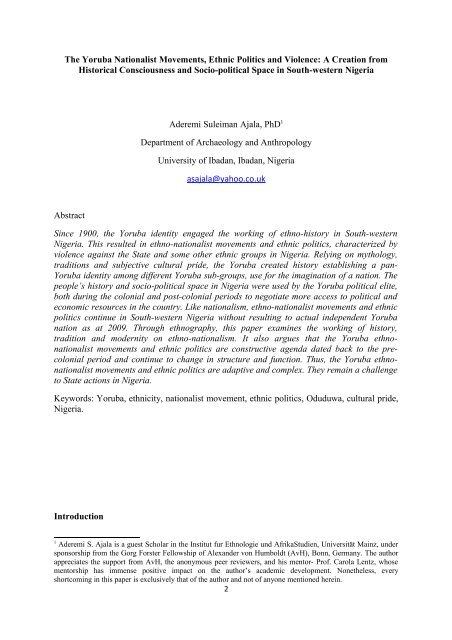The Yoruba Nationalist Movements, Ethnic Politics and Violence: A ...
The Yoruba Nationalist Movements, Ethnic Politics and Violence: A ...
The Yoruba Nationalist Movements, Ethnic Politics and Violence: A ...
Create successful ePaper yourself
Turn your PDF publications into a flip-book with our unique Google optimized e-Paper software.
<strong>The</strong> <strong>Yoruba</strong> <strong>Nationalist</strong> <strong>Movements</strong>, <strong>Ethnic</strong> <strong>Politics</strong> <strong>and</strong> <strong>Violence</strong>: A Creation from<br />
Historical Consciousness <strong>and</strong> Socio-political Space in South-western Nigeria<br />
Aderemi Suleiman Ajala, PhD 1<br />
Department of Archaeology <strong>and</strong> Anthropology<br />
University of Ibadan, Ibadan, Nigeria<br />
asajala@yahoo.co.uk<br />
Abstract<br />
Since 1900, the <strong>Yoruba</strong> identity engaged the working of ethno-history in South-western<br />
Nigeria. This resulted in ethno-nationalist movements <strong>and</strong> ethnic politics, characterized by<br />
violence against the State <strong>and</strong> some other ethnic groups in Nigeria. Relying on mythology,<br />
traditions <strong>and</strong> subjective cultural pride, the <strong>Yoruba</strong> created history establishing a pan-<br />
<strong>Yoruba</strong> identity among different <strong>Yoruba</strong> sub-groups, use for the imagination of a nation. <strong>The</strong><br />
people’s history <strong>and</strong> socio-political space in Nigeria were used by the <strong>Yoruba</strong> political elite,<br />
both during the colonial <strong>and</strong> post-colonial periods to negotiate more access to political <strong>and</strong><br />
economic resources in the country. Like nationalism, ethno-nationalist movements <strong>and</strong> ethnic<br />
politics continue in South-western Nigeria without resulting to actual independent <strong>Yoruba</strong><br />
nation as at 2009. Through ethnography, this paper examines the working of history,<br />
tradition <strong>and</strong> modernity on ethno-nationalism. It also argues that the <strong>Yoruba</strong> ethnonationalist<br />
movements <strong>and</strong> ethnic politics are constructive agenda dated back to the precolonial<br />
period <strong>and</strong> continue to change in structure <strong>and</strong> function. Thus, the <strong>Yoruba</strong> ethnonationalist<br />
movements <strong>and</strong> ethnic politics are adaptive <strong>and</strong> complex. <strong>The</strong>y remain a challenge<br />
to State actions in Nigeria.<br />
Keywords: <strong>Yoruba</strong>, ethnicity, nationalist movement, ethnic politics, Oduduwa, cultural pride,<br />
Nigeria.<br />
Introduction<br />
1<br />
Aderemi S. Ajala is a guest Scholar in the Institut fur Ethnologie und AfrikaStudien, Universität Mainz, under<br />
sponsorship from the Gorg Forster Fellowship of Alex<strong>and</strong>er von Humboldt (AvH), Bonn, Germany. <strong>The</strong> author<br />
appreciates the support from AvH, the anonymous peer reviewers, <strong>and</strong> his mentor- Prof. Carola Lentz, whose<br />
mentorship has immense positive impact on the author’s academic development. Nonetheless, every<br />
shortcoming in this paper is exclusively that of the author <strong>and</strong> not of anyone mentioned herein.<br />
2

















